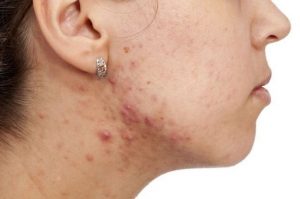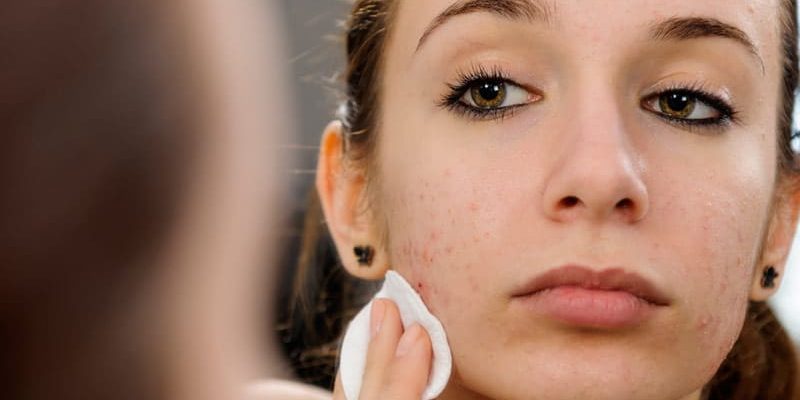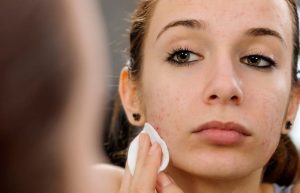Spironalactone Treatment for Acne in Essex
What is spironolactone and how does it work in the treatment of acne?
Spironolactone is a drug usually prescribed for patients with heart problems, high blood pressure and fluid retention. It can also have hormonal effects by blocking the action of androgens, “male hormones”, that are normally produced by women in low levels. Some women have raised levels of androgens or increased sensitivity to normal levels of androgens and this can lead to skin disorders. Spironolactone thus can be used in the management of these conditions.

Spironolactone is often a good treatment for women with PCOS
What skin conditions are treated with spironolactone?
Spironolactone is used ‘off-licence’ to treat women with acne, female pattern hair loss and hirsutism (male pattern hair growth in women). “Off-licence” means that is not specifically indicated for these conditions in the prescribing licence. It is also used in the management of polycystic ovarian syndrome (PCOS). It is not usually given to men to treat skin problems. Will spironolactone cure my condition? Spironolactone is not a cure but taken long-term it can help control and sometimes clear acne. It can help reduce excess facial and body hair and improve the thickness of scalp hair in women with certain types of hair loss. The treatment works slowly over several months.
How long will I need to take spironolactone before I see an effect?
Most women find that their acne starts to improve after about 3 months of treatment. Hair complaints take longer, and treatment usually needs to be continued for up to six months before the benefit can be seen.
What are the common side effects of spironolactone?
Common side-effects in pre-menopausal women include breast tenderness/enlargement and irregular menstrual periods. These symptoms usually settle with continued treatment and may be helped by taking spironolactone with the oral contraceptive pill. Spironolactone can cause a drop in blood pressure when going from sitting to standing (postural hypotension) which causes dizziness, a light-headed feeling or fainting. Uncommon side effects include drowsiness, fatigue, headache, loss of libido (sex drive) and very rarely, confusion and loss of coordination. As this medication is a diuretic it can increase the amount of urine produced by the body.
What are the rare side effects of spironolactone?
Raised blood levels of potassium levels may occur during treatment with spironolactone. This is uncommon in younger patients (< 45 years) and those without heart or kidney problems and in people who do not take other drugs that affect potassium levels. It may very rarely cause abnormal blood counts and allergic rashes. Animal tests with very high doses of spironolactone showed a possible association with cancer, but this has not been observed in normal use of this medication in humans.
Are any other precautions necessary?
Do not take this medication if you are pregnant or planning to become pregnant as it can affect the normal development of your unborn child. Women taking spironolactone should use effective contraception to prevent pregnancy. Taking combined oral contraceptive pills in combination with spironolactone can increase its effectiveness in treating acne as well as providing contraception and reducing hormonal side-effects such as menstrual irregularities.
How will I be monitored for the side effects of spironolactone treatment?
Your doctor may recommend a blood test to check your potassium level before starting treatment and occasionally during treatment. These checks may be needed more frequently if you have heart or kidney problems or if you take other medication that affects potassium levels.
May I drink alcohol while taking spironolactone?
Drinking alcohol may increase some of the side-effects of spironolactone such as dizziness. It would be advisable to moderate your alcohol consumption in accordance with recommended guidelines.
Can I take other medicines at the same time as spironolactone?
If you are taking any of the following medications, please inform your doctor (you can check with your doctor or pharmacist): • Diuretics (“water tablets”) • Potassium supplements • ACE Inhibitors (eg quinapril, captopril) • Tablets for high blood pressure • Aspirin, indomethacin (an anti-inflammatory/analgesic drug) • Digoxin (used to treat heart conditions) • Trimethoprim and trimethoprim-sulfamethoxazole (types of antibiotics)
What happens next?
If you would like to ask our Medical Director & Nurse Consultant, Sue Ibrahim a message, by all means do. We provide a responsive service that aims to set your mind at ease and ensure you are fully informed before booking your consultation. At Elan Medical Skin Clinic in Essex, all new patients receive a thorough consultation and medical assessment prior to treatment.
How do I book an appointment?
You can either call Elan Medical Skin Clinic on 01268 770660 between 9.30am and 5pm Monday to Saturday or you can click here to book online and one of our reception team will contact you by phone or email, whichever you prefer. You will be asked to pay your initial consultation fee by credit or debit card on confirming your appointment.


